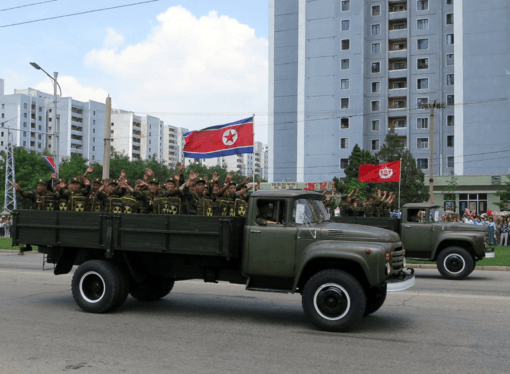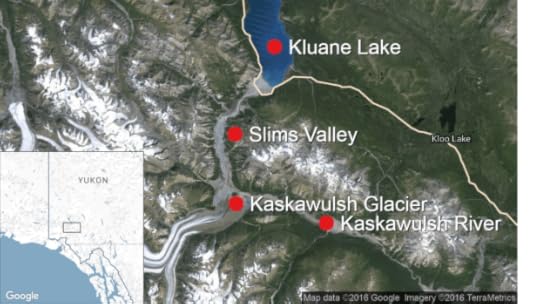Steve Bull's Blog, page 1378
April 17, 2017
The Problem is Washington, Not North Korea

Photo by Stefan Krasowski | CC BY 2.0
Washington has never made any effort to conceal its contempt for North Korea. In the 64 years since the war ended, the US has done everything in its power to punish, humiliate and inflict pain on the Communist country. Washington has subjected the DPRK to starvation, prevented its government from accessing foreign capital and markets, strangled its economy with crippling economic sanctions, and installed lethal missile systems and military bases on their doorstep.
Negotiations aren’t possible because Washington refuses to sit down with a country which it sees as its inferior. Instead, the US has strong-armed China to do its bidding by using their diplomats as interlocutors who are expected to convey Washington’s ultimatums as threateningly as possible. The hope, of course, is that Pyongyang will cave in to Uncle Sam’s bullying and do what they are told.
But the North has never succumbed to US intimidation and there’s no sign that it will. Instead, they have developed a small arsenal of nuclear weapons to defend themselves in the event that the US tries to assert its dominance by launching another war.
There’s no country in the world that needs nuclear weapons more than North Korea. Brainwashed Americans, who get their news from FOX or CNN, may differ on this point, but if a hostile nation deployed carrier strike-groups off the coast of California while conducting massive war games on the Mexican border (with the express intention of scaring the shit of people) then they might see things differently. They might see the value of having a few nuclear weapons to deter that hostile nation from doing something really stupid.
…click on the above link to read the rest of the article…
The High Cost of Renewable Subsidies
 I have for some time wanted to get to the bottom of renewable subsidies and their impact upon electricity prices. But the complexity and opacity of the system has always defeated me. And then last week a report titled “Status Review of Renewable Support Schemes in Europe” landed in my inbox and it seemed to contain much of the information I was seeking. The headline numbers: the weighted average subsidy paid to renewable generators in EU 26 in 2015 was €110 / MWh. The maximum was €184 / MWh in the Czech Republic and the minimum €16.2 / MWh in Norway and the UK came in at €75 / MWh.
I have for some time wanted to get to the bottom of renewable subsidies and their impact upon electricity prices. But the complexity and opacity of the system has always defeated me. And then last week a report titled “Status Review of Renewable Support Schemes in Europe” landed in my inbox and it seemed to contain much of the information I was seeking. The headline numbers: the weighted average subsidy paid to renewable generators in EU 26 in 2015 was €110 / MWh. The maximum was €184 / MWh in the Czech Republic and the minimum €16.2 / MWh in Norway and the UK came in at €75 / MWh.
Considering that the wholesale price of electricity in Europe is typically €40 to €60 / MWh we can see that renewables are costing on average about 3 times as much as conventional power (wholesale~50, subsidy~110, total~160). And politicians, who have mandated the use of renewable electricity, are wondering why electricity prices are rising.
The report was published by the Council of European Energy Regulators (CEER) on 11th April 2017. But since it summarises a vast amount of complex data that has taken considerable time to compile, the reference years reported are 2014 and 2015. The report can be downloaded here.
Figure 1 [Report Table 4] Total renewable electricity produced that received subsidy support in 2015 in MWh.
Figure 2 Sorting total subsidised generation from Figure 1 shows Germany way out in front with 162 TWh of subsidised renewable generation followed by the UK, Italy, Spain and France.
Figure 3 The 4 largest RE producers with categories of generation broken out and normalised to 100% shows different solutions for different countries. Germany relies mainly on bio energy, solar and onshore wind. The UK on bio energy onshore and offshore wind. Italy on bio energy solar and onshore wind, rather similar to Germany but with more solar and less wind. Spain on solar and onshore wind. It is notable how important bio energy has become. Only time will tell if this leads to deforestation. There seems to be a lot of woodland disappearing in Scotland right now.
…click on the above link to read the rest of the article…
Climate change causes glacial river in Yukon to change direction
Glacier retreated so much that its meltwater switched course, in an event not documented in modern times

Geoscientist Dan Shugar gazes out over exposed sediments and dust storms at Kluane Lake in the Yukon in the summer of 2016. Covered in water just months before, the delta top was left exposed and prone to wind erosion after meltwater from the Kaskawulsh Glacier changed direction due to climate change. (Jim Best/University of Illinois)
Climate change has caused the massive Kaskawulsh Glacier in the Yukon to retreat so much that its meltwater abruptly switched direction, in the first documented case of “river piracy” in modern times.
Instead of flowing into the Slims River and then north to the Bering Sea, the water has changed course and now flows south toward the Kaskawulsh River, the Gulf of Alaska and the Pacific Ocean, scientists have found.
Also known as stream capture, river piracy is a term used to describe a geologic phenomenon where a stream or river is diverted toward another body of water. It’s usually caused by a dramatic tectonic event, such as a landslide or glacial dam collapse.
“This was the first event we could find where river piracy occurred right under our noses and due to contemporary climate change,” said Dan Shugar, a geoscientist at the University of Washington Tacoma and lead author of a study published Monday in the journal Nature Geoscience.

Yukon’s Kaskawulsh glacier in Kluane National Park. (CBC)
Previous cases of river piracy may have taken place thousands of years ago or more, said Shugar in an interview with CBC News.
A river gone missing
The discovery of the change happened last summer, quite by accident for this team of scientists.
…click on the above link to read the rest of the article…
April 16, 2017
I Feel Sick, Because The U.S. Is On The Verge Of Making An Extremely Costly Mistake
 All day long I have just felt sick. Right at this moment, we are closer to war with North Korea than we have been at any point since the Korean War ended in 1953. If Donald Trump decides to launch a military strike against North Korea’s nuclear facilities, the consequences could be absolutely catastrophic. The North Koreans have already promised to launch nukes at South Korea and at U.S. military bases in the region in return, and they also have vast stockpiles of chemical and biological weapons that they could use as well. To get an idea of the chaos that just a handful of North Korean agents armed with biological weapons could unleash inside the United States, just see this article. A military strike on North Korea could be the spark that sets off a global war in which millions of people die, and so we need to do all that we can to prevent this from happening. My hope is that if people make enough noise that Trump will back down and decide not to attack.
All day long I have just felt sick. Right at this moment, we are closer to war with North Korea than we have been at any point since the Korean War ended in 1953. If Donald Trump decides to launch a military strike against North Korea’s nuclear facilities, the consequences could be absolutely catastrophic. The North Koreans have already promised to launch nukes at South Korea and at U.S. military bases in the region in return, and they also have vast stockpiles of chemical and biological weapons that they could use as well. To get an idea of the chaos that just a handful of North Korean agents armed with biological weapons could unleash inside the United States, just see this article. A military strike on North Korea could be the spark that sets off a global war in which millions of people die, and so we need to do all that we can to prevent this from happening. My hope is that if people make enough noise that Trump will back down and decide not to attack.
Earlier today, I was sent the following piece of intel. I was told that I could share it with all of my readers as long as I kept the name of the individual that sent it to me out of it. According to this source, it certainly looks as though an attack is being prepared…
An O-5 silver maple leaf Air Force puke says the bomb buses in Guam are maximum loaded, fully fueled and reserves are topped off. Reserves are only topped off just before the buses go airborne.
Kunsan has everything pointed north and ALL gates are closed…no traffic in or out.
…click on the above link to read the rest of the article…
Blowout Week 172
 In this week’s Blowout we return to Brexit and its impacts. It is now reported that following Brexit the UK will “scale down its concern over climate change” and scrap the EU’s 15%-of-total-energy-from-renewables-by-2020 target. Can outright repeal of the 2008 Climate Change Act be far behind?
In this week’s Blowout we return to Brexit and its impacts. It is now reported that following Brexit the UK will “scale down its concern over climate change” and scrap the EU’s 15%-of-total-energy-from-renewables-by-2020 target. Can outright repeal of the 2008 Climate Change Act be far behind?
Telegraph: Britain preparing to scrap EU green energy targets after Brexit
The UK is currently committed to getting 15 per cent of all energy from renewable sources such as wind and solar by 2020. The UK is currently on course to miss the target and incur millions of pounds in fines from the European Union.
Government sources told The Daily Telegraph that the target, under the EU Renewable Energy Directive, is likely to be scrapped after Brexit. It comes after civil service documents, photographed on a train, revealed that Britain plans to scale down its concern over climate change after Brexit. Details of the policy change were contained in the papers of a senior civil servant at the Department for International Trade (DIT) photographed by a passenger earlier this month. The notes say: “Trade and growth are now priorities for all posts — you will all need to prioritise developing capability in this area. Some economic security-related work like climate change and illegal wildlife trade will be scaled down.” The target has led to billions of pounds Government subsidies for renewable power sources such as wind, solar and biomass power plants, which are ultimately paid for by customers through their energy bills. The National Audit Office estimated that green energy subsidies will cost every household £110 a year by 2020.
We follow up with the usual mix of energy and related stories from all over the world, including how OPEC cheated on production cuts, the North Sea revival, Japan makes natural gas from methane hydrates, the growth of nuclear subsidies in the US, more US underground nuclear waste storage planned,
…click on the above link to read the rest of the article…
Obama/Trump: Contrasting Deceivers
On the surface, Donald Trump and Barack Obama may seem like polar opposites but they are alike in one fundamental way: both promised to challenge a corrupt and brutal establishment but promptly caved in, writes Sam Husseini.
Donald Trump won the 2016 Republican nomination and the general election largely because he was able to pose as a populist and an anti-interventionist, an “America Firster.” Similarly, Barack Obama won the 2008 election in good part because he promised “hope and change” and because he had given a speech years earlier against the then-impending invasion of Iraq.
President Barack Obama reaffirming his oath of office on Jan. 21, 2013, with his hand on Bibles belonging to Abraham Lincoln and Martin Luther King Jr. (White House photo)
Short of disclosure of diaries or other documents from these politicians, we can’t know for certain if they planned on reversing much of what they promised or if the political establishment compelled them to change, but they both reversed themselves on their core messages, committing what you might call a massive political fraud. Yet, what is perhaps most striking is how quickly each of them backtracked on their winning messages, particularly since they were both proclaimed as representing “movements” seeking to shake up the system.
Even before taking office, Obama stacked his administration with pro-war people: He kept George W. Bush’s head of the Pentagon, Robert Gates; for Secretary of State he nominated Hillary Clinton, whom he beat largely because she voted for giving Bush authorization to invade Iraq; he surrounded himself with other prominent Iraq War backers including Vice President Joe Biden and senior foreign policy advisers Susan Rice and Richard Holbrooke. Even before he was sworn in, Obama had supported the 2008 Israeli slaughter of Palestinians in Gaza. [See from 2008: “Anti-War Candidate, Pro-War Cabinet?“]
…click on the above link to read the rest of the article…
Trying to Save Monte Paschi – Oldest Bank in the World
 The EU Commission is looking to bailout Monte Paschi by almost eliminating more than 5,000 jobs. The Monte Paschi plan that was presented last October called for 2600 layoffs. It is the oldest surviving bank in the world and the third largest Italian commercial and retail bank by total assets. This makes it a critical bank in Italy. It has been struggling to avoid a collapse. It was founded in 1472 by the magistrates of the city state of Siena as a “mount of piety” by name.
The EU Commission is looking to bailout Monte Paschi by almost eliminating more than 5,000 jobs. The Monte Paschi plan that was presented last October called for 2600 layoffs. It is the oldest surviving bank in the world and the third largest Italian commercial and retail bank by total assets. This makes it a critical bank in Italy. It has been struggling to avoid a collapse. It was founded in 1472 by the magistrates of the city state of Siena as a “mount of piety” by name.
 It was Pope Gregory IX (1127-1241) who became the first Pope to appoint a noble merchant family of Siena as the official Papal depository in 1233 – the Piccolomini headed by Angeliero Solafico. The appointment of the Piccolomini family as the Papal Depository in 1233, led to Siena rising to become the first Financial Capital of Europe emerging at this time.
It was Pope Gregory IX (1127-1241) who became the first Pope to appoint a noble merchant family of Siena as the official Papal depository in 1233 – the Piccolomini headed by Angeliero Solafico. The appointment of the Piccolomini family as the Papal Depository in 1233, led to Siena rising to become the first Financial Capital of Europe emerging at this time.
The Piccolomini family rose in credibility among all the merchants. Their Palazzo Piccolomini still exists which was their Palace. Eventually, their family would later produce two Popes, Pius II (1458-1464) and Pius III (1503). The Piccolomini were conservative merchants who had offices in Genoa, Venice, Aquileria. Triests, and above the Alps they opened both in France and Germany.
Siena was therefore the rebirth of banking after the Dark Age. The Banca Monte dei Paschi di Siena was founded by order of the Magistrature of the Republic of Siena as Monte di Pietà back in 1472. Since then the bank has been in operation without interruption to the present day. It formed on the second economic expansionary wave that came 224 years after the birth of the first economic wave in the 13th century.
Toronto homeowners cash out of hot real estate market amid uncertainty
Agent says some buyers are delaying purchases in anticipation of possible fixes

Many buyers and sellers are waiting to see what will come of Tuesday’s scheduled meeting between Finance Minister Bill Morneau, Ontario Finance Minister Charles Sousa and Toronto Mayor John Tory, who are expected to discuss ways to rein in Toronto’s hot housing market. (The Canadian Press)
Sarah Blakely recalls feeling some trepidation when she and her husband shelled out more than $300,000 for a modest 1 1/2-storey house in a less-desirable part of Toronto.
Seven years later, they found themselves on the right side of a hot housing market, with values tripling in a ‘hood suddenly considered up-and-coming for young families seeking detached homes.
They recently sold that renovated three-bedroom for more than $1 million and now expect to live mortgage-free in a four-bedroom purchase in their hometown of Ottawa.
The 34-year-old says it made sense to cash out of a city that was draining their finances, energy and family time.
“My husband and I saw an opportunity to take advantage of the recent gains in real estate and to move to a less expensive city to live mortgage-free, support our savings for retirement and also to be closer to family,” says Blakely, whose new home has nearly twice the square footage.

A sold sign is shown in front of a west-end Toronto home. (Graeme Roy/The Canadian Press)
And they may have taken action at just the right time.
Blakely’s real estate agent Josie Stern says the market appears to be cooling, and doubts Blakely could fetch that same jackpot sale today.
“A little bit of air has been let out of the bubble,” she says.
…click on the above link to read the rest of the article…
Ron Paul: “Peace is Popular”
Reporting from Mexico City…
 Last Saturday, as we’ve been reporting this week, Ron Paul and many other notables in the liberty sphere took to the stage in Lake Jackson, Texas, for a very important symposium.
Last Saturday, as we’ve been reporting this week, Ron Paul and many other notables in the liberty sphere took to the stage in Lake Jackson, Texas, for a very important symposium.
The topic of discussion? War and Peace in the Age of Trump.
As promised, today we present to you highlights from Ron Paul’s speech, Peace is Popular.
Lots of great stuff to cover.
So let’s get to it…
Ron Paul on liberty…
“Liberty is a young idea,” Dr. Paul began. “It’s really not something that’s been around for thousands and thousands of years. And the benefits of liberty have just been rather recent. I think of the Industrial Revolution as a consequence of an understanding of economic liberty. And with the tremendous advancements that have existed with the Industrial Revolution I’ve always wondered, why don’t we advance in the social revolution?
“If we learn how to build so many wonderful things and the standard of living goes up for so many people and we have all of these luxuries, why is it that we haven’t figured out how to stay out of killing each other?
“So at the same time we’ve had all of this advancement that helped us with technological things and the Industrial Revolution, we’ve had more killing than ever before.
“Just think of the 20th century, with all of that advancement. I can’t help but think about my dad talking to me about when the family dairy started. He delivered milk in a horse and wagon. And that was at the beginning of the last century. It was so recent and yet we haven’t advanced very much in this social sphere of how we get along with people. I am an optimist because I believe we should be able to do that. And when you look at the history of mankind, it’s really so very young.”
…click on the above link to read the rest of the article…
The Last Country We “Liberated” from an “Evil” Dictator Is Now Openly Trading Slaves
(ANTIMEDIA) It is widely known that the U.S.-led NATO intervention to topple Libya’s Muammar Gaddafi in 2011 resulted in a power vacuum that has allowed terror groups like ISIS to gain a foothold in the country.
Despite the destructive consequences of the 2011 invasion, the West is currently taking a similar trajectory with regard to Syria. Just as the Obama administration excoriated Gaddafi in 2011, highlighting his human rights abuses and insisting he must be removed from power to protect the Libyan people, the Trump administration is now pointing to the repressive policies of Bashar al-Assad in Syria and warning his regime will soon come to an end — all in the name of protecting Syrian civilians.But as the U.S. and its allies fail to produce legal grounds for their recent air strike — let alone provide concrete evidence to back up their claims Assad was responsible for a deadly chemical attack last week — more hazards of invading foreign countries and removing their heads of state are emerging.
This week, new findings revealed another unintended consequence of “humanitarian intervention”: the growth of the human slave trade.
The Guardian reports that while “violence, extortion and slave labor” have been a reality for people trafficked through Libya in the past, the slave trade has recently expanded. Today, people are selling other human beings out in the open.
“The latest reports of ‘slave markets’ for migrants can be added to a long list of outrages [in Libya],” said Mohammed Abdiker, head of operation and emergencies for the International Office of Migration, an intergovernmental organization that promotes “humane and orderly migration for the benefit of all,” according to its website. “The situation is dire. The more IOM engages inside Libya, the more we learn that it is a vale of tears for all too many migrants.”
…click on the above link to read the rest of the article…







